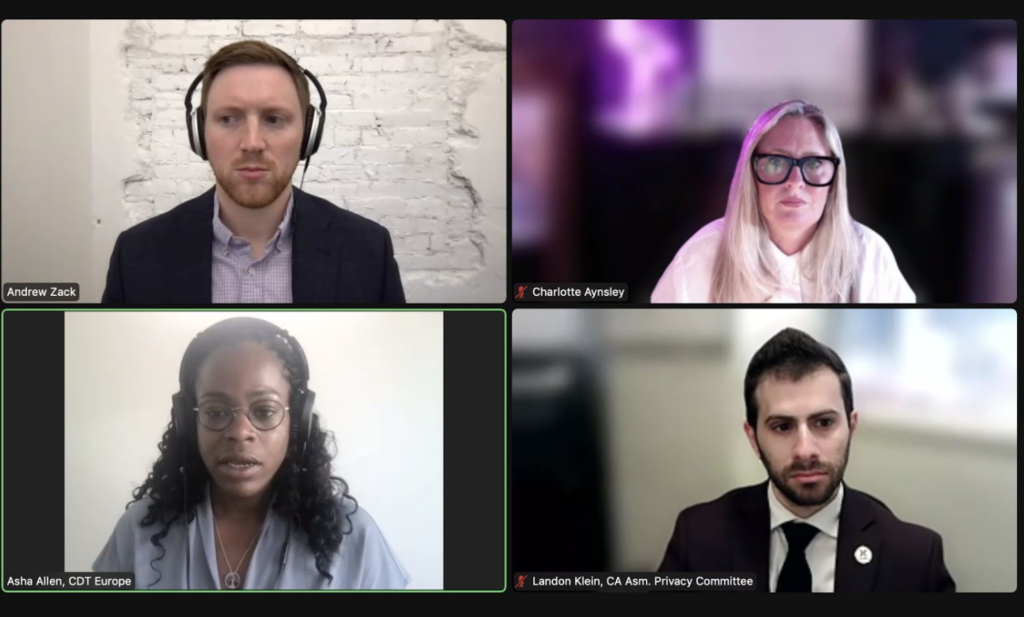European Policy, Government Surveillance, Privacy & Data
EU Tech Policy Brief: May 2022 Recap
This is the May 2022 recap issue of the Centre for Democracy & Technology Europe‘s monthly Tech Policy Brief. It highlights some of the most pressing technology and internet policy issues under debate in Europe, the U.S., and internationally, and gives CDT’s perspective on them. Our aim is to help shape policies that advance our rights in a digital world. Please do not hesitate to contact our team in Brussels: Iverna McGowan, Asha Allen, and Ophélie Stockhem.
CDT Europe Addresses Joint Parliamentary Hearing on Combating Online Gender-Based Violence
In light of the new proposal for a Directive on combating violence against women and domestic violence, CDT’s Asha Allen spoke at a joint hearing on 10 May on combating online gender-based violence (GBV). The hearing was held by the Committee on Civil Liberties, Justice and Home Affairs, and the Committee on Women’s Rights and Gender Equality at the European Parliament.
Allen highlighted EU-level legislation and harmonised legal standards as some of the best means for addressing cyberviolence, especially since the EU has signed but not yet ratified the Istanbul Convention, which establishes crucial binding legal standards to prevent and combat violence against women and domestic violence. Allen also welcomed the Parliament proposal’s mechanisms for redress and specialised support for victims of online GBV, which are an important step towards eradicating this form of abuse. She insisted that it is also important to clarify the responsibilities of platforms and law enforcement authorities, and to formulate strong and effective policies to implement these standards with an adequate, gender-sensitive, and intersectional approach.
Allen also mentioned that the Directive must work in tandem with the Digital Services Act, which lists online gender-based violence as a systemic risk, and be thoughtfully balanced with the right to freedom of expression.
CDT Europe Raises Concerns About Recent European Commission CSAM Proposal
On 11 May, the European Commission adopted a proposal on child sexual abuse material (CSAM), which obliges providers of web hosting and interpersonal communication services to detect, remove, and block content depicting sexual abuse of minors.
Despite calls from CDT Europe and other civil society partners for the proposal to comply with EU fundamental rights and freedoms, it would effectively create a mass surveillance program in Europe. Though CDT Europe recognises the crucial need to combat CSAM, mandating that online providers scan all communications — and provide law enforcement with access to those communications — would be a serious mistake.
The proposal as it stands does not justify unduly interfering with privacy rights and encryption, which are essential to communicate securely online, especially for at-risk groups such as human rights defenders and journalists. Neither does it justify grossly empowering law enforcement agencies with mass surveillance capabilities, especially considering the lack of meaningful oversight and safeguards in the draft legislation.
We therefore urge EU lawmakers to correct course to ensure that the new proposal does not compromise the right to privacy and anonymity of millions of users, and to protect encryption, which is crucial for civic space to flourish.
CDT Europe Joins FOSI “Brief the Hill” Event on Global Online Safety Policy
On 16 May, Asha Allen, CDT Advocacy Director for Europe, Online Expression & Civic Space, joined a panel organised by the Family Online Safety Institute to discuss current policy efforts to improve online safety. The panel covered legislation including the Digital Services Act (DSA) in the EU, the Age Appropriate Design Code and Online Safety Bill in the UK, and the Age-Appropriate Design Code Act in California.
Allen unpacked the specific provisions of the DSA that are relevant for online safety, in particular those covering systemic risks stemming from the services provided by very large online platforms and mitigation of those risks. She insisted that, if these provisions are implemented effectively, they would truly set the DSA apart and radically change online content governance globally. Allen also outlined the DSA’s new measures on the online protection of minors, which include risk assessment and transparency obligations imposed on online platforms to ensure a high level of privacy, safety, and security for underage users, and a ban on targeted advertising that relies on the personal data of minors.
Beyond the uncertainty around how these specific provisions on child protection will be implemented across all 27 EU member states, Allen emphasised how ongoing discussions on the protection of minors demonstrate the need for the EU to keep reflecting on the importance of strong privacy protection measures for all users.

Digital Services Act Snapshot
In a significant step forward for platform governance and the protection of the fundamental rights of online users, co-legislators in the European Commission, Council of the European Union, and European Parliament reached a provisional agreement on the Digital Services Act at the end of last month.
Although the DSA establishes some welcome obligations for greater transparency and accountability of online platforms, crucial safeguards for privacy and end-to end encryption introduced by the European Parliament were removed from the final text. Based on what we know of the agreement thus far, CDT Europe believes that the proposal still contains significant shortcomings. The text is going through final clarifications and cleanup following the political agreement, but several key provisions are still unclear. Nonetheless, the text is expected to be finalised before a vote in the Internal Market Committee of the European Parliament in June, with a plenary vote in July, coinciding with the adoption of the Digital Markets Act (DMA).
Welcome Back to CDT Europe’s Director
Iverna McGowan, CDT Europe’s Director, has returned from maternity leave, and is looking forward to catching up with all of CDT’s stakeholders over the coming weeks and months. Welcome back, Iverna!


